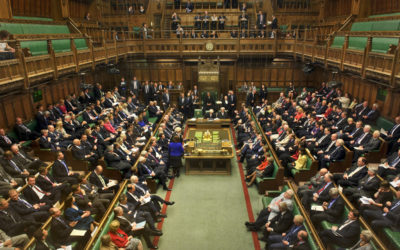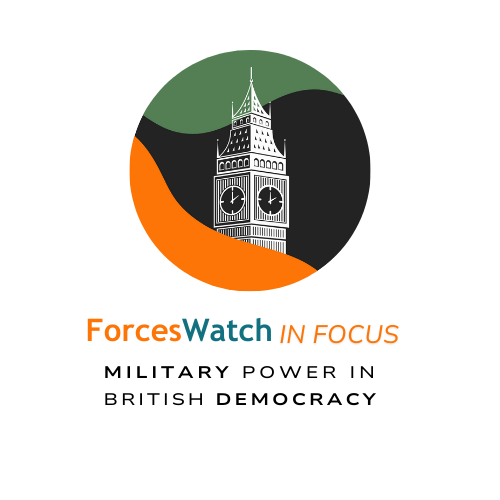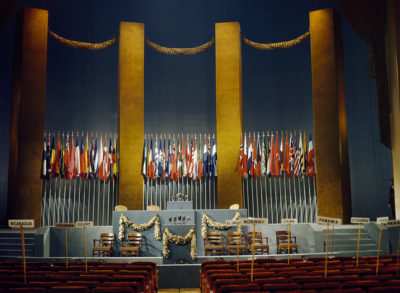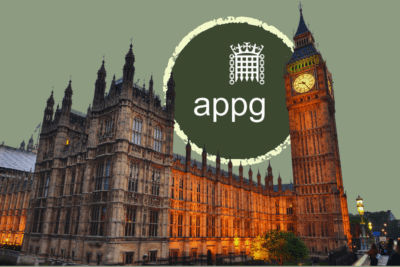What lies behind Parliament’s military cosplay scheme?

Over the last five to ten years it has been increasingly common to see MPs playing soldiers for the camera. Usually this kind of martial dress-up garners a few laughs on Twitter, letting MPs play the patriot for a few hours and get some good snaps for their election campaign leaflets.
The truth is less clear cut. The Armed Forces Parliamentary Scheme (AFPS) fits into a broader and older pattern of militarising democracy, involving not only the military, or MPs eager to be photographed riding in tanks, but some of the world’s largest arms firms.
The Scheme
The AFPS was founded in 1989 by then Conservative MP, and former TA colonel, Sir Neil Thorne. Thorne had divined a problem in Parliament: that there were fewer and fewer politicians coming into politics with military backgrounds. As a 2011 speech by Lord Astor, for which Thorne and other supporters of the scheme were present, explains:
‘Our armed forces have been a professional, volunteer force for many years while the older generations have inexorably dwindled. Public understanding of our armed forces has declined as a result. And this matters hugely. Our armed forces rely on the support they receive from the public. They look to you, as Parliamentarians, as a weather vane’.
The value of the scheme had also been touted in the Labour-led 2008 report on the National Recognition of our Armed Forces, in which the idea of attaching an officer to Parliament to increase interface between lawmakers and the military was recommended. This was one of a range of measures put forward by the report – and the wider “militarisation offensive” – explored by ForcesWatch and Professor Paul Dixon in Warrior Nation.
It was suggested that one of the officer’s roles would be responding to inquiries about the AFPS:
‘He or she might also have a role in relation to enquiries about the Armed Forces Parliamentary Scheme, and requests to visit military establishments, other than as a member of the Defence Select Committee or as a local MP’.
The scheme involves MPs or Peers spending at least 15 days in a year with either the Army, Navy or RAF, visiting both UK and overseas bases. The optics of dressing up as service personnel seems to appeal to a militarised parliamentary politics – more than 90 parliamentarians (over 50% of them Conservatives) graduated between 2014-2020. The Liberal Democrat defence spokesperson in the Lord, Baroness Smith of Newham, took part in the scheme in four of the six years across this period: all three services plus a course at the Royal College of Defence Studies.
Vicarious militarism
The aim, according to the AFPS, is that the experience will enable participants – or “students” – to ‘make a more informed and useful contribution to defence debates in their respective Houses’. Upon completion, participating MPs and Peers are presented with a graduation certificate and an honorary military rank. From then on, graduates will usually open their contribution to defence related debates with the proud proclamation that they have been on the scheme.
Some of the most prominent AFPS images in recent years are of Labour MPs from the right of the party, including Liz Kendall, Toby Perkins and Ruth Smeeth. Kendall, in particular, seemed to enjoy the experience, posing on a tank and firing a Kalashnikov as part of a cohort including Conservative MP, and current International Trade Secretary, Anne-Marie Trevelyan. Both Smeeth and Trevelyan – like Baroness Smith – took part in more than one cohort.
Yet, it’s not only the armed forces that get to improve their image with politicians. A quick search for the AFPS on Facebook throws up a range of images, including MPs being briefed by military personnel who are wearing BAE Systems-branded hats. In another picture, at RAF Valley, a group of MPs – including Caroline Johnson and Robert Courts – are themselves wearing BAE hats.
Arms Firms
According to an archived potted history on the Armed Forces Parliamentary Trust website, arms firms funded the scheme from the beginning – alongside Thorne himself, who paid large amounts into the 1988 trial scheme:
‘The Plessey Company, BAE and Vickers agreed to pay £1,500 each leaving the Chairman to pay the £10,500 shortfall out of his own pocket’.
Plessey and Vickers, it should be noted, have long since merged into BAE Systems. This left room for other companies to fill the void.
The response to a 2007 parliamentary question by Conservative (later, UKIP) MP Douglas Carswell indicated that the scheme had been funded by three arms firms – BAE Systems, Rolls-Royce and AugustaWestland – to the tune of £40,500 a year across the previous five years. Thorne, the response indicated, also continued to contribute financially.
The involvement of arms firms continues today and the Armed Forces Parliamentary Trust, which oversees the AFPS, claims on its website that it is only able to operate ‘by virtue of sponsorship from industry’. It is not clear how much money they donate – the scheme’s £95k gross income for 2020 is not broken down into sources – or exactly what benefit the firms derive in terms of access to MPs, but, as mentioned above, BAE Systems and Babcock logos are a staple feature in photographs of MPs on the RAF segment.
Access concerns aside, arms companies do appear to have an involvement beyond funding. After the scheme was relaunched in 2013 as the Armed Forces Parliamentary Trust, taking on charitable status, it was overseen by eight trustees: two MPs, two Peers, two from the armed forces and two from the defence industry. During a 2013 Commons debate on the relaunch, the scheme’s current chair, Conservative MP James Gray, noted the central role arms firms play in its governance.
‘Last night, in Committee Room 14, we relaunched the scheme under a new name, the armed forces parliamentary trust. It is to be run by nine trustees: two appointed by Mr Speaker, namely Ms Stuart and me; two from the House of Lords, who I think will be Lord Wakeham and Lord Rogan; two from the Ministry of Defence, Air Vice-Marshal David Murray and Sir Bill Jeffrey, the last but one permanent secretary; and two from industry, Helen Kennett of Rolls-Royce and Bob Keen of BAE Systems’.
Today, the industry trustees are John Gardner, who was Group Head of Government Relations at Babcock until March 2021; and William Tew, Director of Global Government Relations and Public Policy at QinetiQ.
The relaunch also widened the number of arms companies funding the scheme, but this has been framed as an attempt to limit the influence any one company may have. As Gray told Parliament in 2013:
‘Traditionally, it has been paid for by the defence industry, and there have been four main sponsors. One of the things that I have been doing over the summer is going round all the defence companies, and I have now secured promises from at least 10 and possibly 15 of them—all the majors, such as Rolls-Royce, BAE Systems and Babcock, as well as others of a similar nature—each paying a small amount of funding, which will be sufficient to cover our anticipated costs’.
‘The reason why that is a better arrangement is because, with 10 or 15 sponsors, we can say that none is achieving anything. Indeed, my pitch to them has been to say, “I would like some money from you, please.” They have asked, “What do we get back?” and I have replied, “You get absolutely nothing in return whatever. This is CSR—corporate social responsibility—for the defence industry. You get no lobbying, no access nor your name on writing paper, unless we choose to do so, but you get the warm feeling, Mr Rolls-Royce”—for example—“ of knowing that you have helped with the education of Members of Parliament.” All of them accepted that’.
The sponsor list is a panoply of global arms companies:
Airbus Operations UK
Babcock International Group
BAE Systems
DXC Technology
Elbit Systems UK
General Dynamics UK
Leonardo MW UK
Lockheed Martin UK
QinetiQ
Raytheon UK
Rolls-Royce
Questions of Access
Whilst Gray is adamant that defence companies contribute to the AFPS out of altruism, a 2019 comment to Parliament by the DUP’s Jim Shannon suggests they could be getting access to MPs for discussions beyond the armed forces:
‘Everyone here will be aware of the work of the armed forces parliamentary scheme, including the dinners it hosts here, and those who sponsor those events. At those events we gather knowledge and we get a sense of the importance of those companies to all regions of the United Kingdom. There is a labour skills base in Northern Ireland, Scotland and Wales, which we need to utilise to its full capability’.
This is the only reference to these AFPS events currently found in Hansard, and there is the possibility that Shannon could be mistaking them for events held by the All-Party Parliamentary Group (APPG) on the Armed Forces – also chaired by James Gray. The APPG is also sponsored by defence companies and invites MPs to briefings believed to be attended by representatives from some of those companies.
Gray makes no attempt to hide his gratitude for these companies, telling the House during a 2021 debate on Defence and Security Industrial strategy:
‘May I first call attention to my entry in the Register of Members’ Financial Interests and my involvement in the all-party parliamentary group for the armed forces and the Armed Forces Parliamentary Trust, both of which I chair and both of which are supported by the major UK defence companies? They are among the greatest defence manufacturers in the world, and I salute them for it’.
There has been some limited questioning of the set up from back benchers. In 2012 Douglas Carswell voiced concern that the scheme could be utilised by industry to get the ear of politicians, writing to then Under-Secretary of State for Defence, Andrew Murrison, to ask:
‘…the Secretary of State for Defence whether he plans to introduce safeguards to prevent the Armed Forces Parliamentary Scheme from becoming a vehicle for lobbying’.
Murrison told Carswell he was not aware of the scheme being used for such purposes. Yet in another written response, to Labour’s Alan Meale, Murrison did divulge that the companies were not necessarily passive actors, and had been involved in the decision on charitable status:
‘The decision to convert the [AFPS] to a charity was agreed unanimously by all AFPS stakeholders (Mr Speaker, the Lord Speaker, myself on behalf of the Secretary of State for Defence, the commercial sponsors, and Sir Neil Thorne (as founder)) on 25 October 2015’.
Again, the potential for lobbying was insinuated when Murrison added:
‘The decision will ensure the Scheme’s long-term sustainability and provide the transparent and accountable governance structure expected of organisations with access to parliamentarians and the Ministry of Defence who are also supported by commercial sponsors’.
Militarist Realism?
Regardless of industry access it is beyond doubt that the scheme is a valuable PR tool for the military – and there is further overlap between the APPG on the Armed Forces and the AFPS on this front. Labour’s Ruth Smeeth alluded to the parallel work of the Trust and the APPG in putting forward the case for the armed forces to MPs. During a January 2018 debate on the UK’s amphibious capabilities, she told the Commons:
‘One important thing, demonstrated here today, is that the armed forces parliamentary scheme and the all-party parliamentary group on the armed forces inform us all and ensure that the standard of debate in the House is as high as it can be’.
It is easy to make light of many MPs’ obsession with proximity to the military. A high degree of deference to the martial narratives of British identity has become, in essence, a necessary tickbox for participation in mainstream politics. Yet, there is an underlying question of ethics. In this reading, the AFPS is far from benign. Instead, it can be interpreted as another lobbying nexus between democratically-elected officials, powerful arms firms and the military.
The fact that the details of the scheme are little commented upon is worrying, suggesting a kind of militarist realism, in which such interactions are normalised not only in society generally, and in the press, but at the very heart of UK democracy.
See more: military in society, Armed Forces Parliamentary Scheme, UK Parliament, democracy, militarisation
Like what you read?
> Sign up for our newsletter or blog notifications
> Support our work – from just £2 a month











